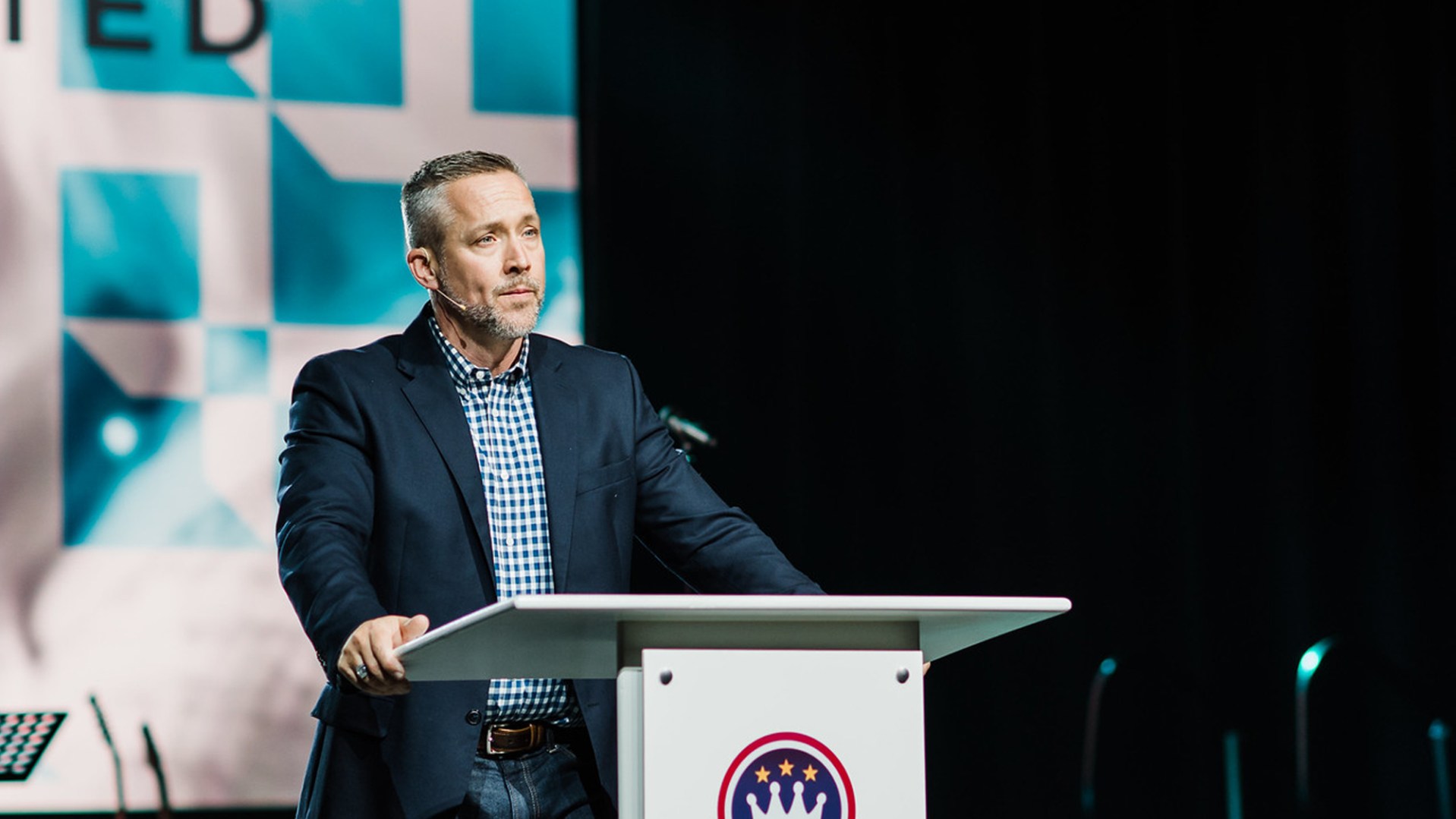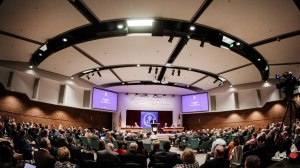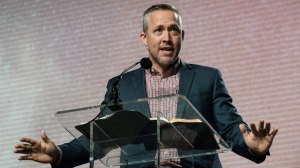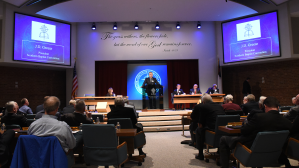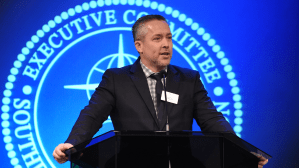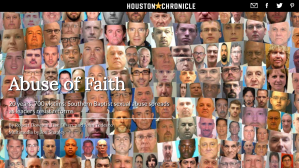In this series
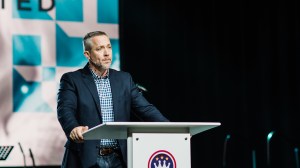
Southern Baptist Convention President J. D. Greear acknowledged that while sexual abuse survivors have pleaded with leaders for years, the denomination had failed to act on their claims and in some cases, sidelined them as attacks.
“It is wrong to characterize someone as ‘just bitter’ because they raised their voice when their warnings were not heeded,” Greear told the crowd at the Ethics and Religious Liberty Commission (ERLC)’s Caring Well conference last weekend. “Anger is an appropriate response, a biblical response, in that circumstance.”
Greear praised the outspokenness and ongoing courage of SBC abuse survivors, naming from the stage both those who spoke at the event in surburban Dallas as well as others who have continued to critique the denomination’s response.
After hearing his remarks, “I actually choked up,” tweeted Tiffany Thigpen, whose story of allegedly being attacked by pastor Darrell Gilyard in the early 1990s was recently featured in the Houston Chronicle.
She wrote on Friday, “Yet there is no apology for [church leaders not rushing to defend abuse survivors from the start]. There are hundreds of victims out here in great agony from the secondary abuse & you still haven’t said, ‘We all have taken part and we all failed greatly, and now we are going to show you.’”
At the three-day event, more than 1,600 Southern Baptist pastors, leaders, and laypeople gathered to hear abuse prevention experts and survivors share on topics from how to screen church employees and volunteers to how to recognize grooming behaviors and respond to abuse disclosures.
Sexual abuse survivors Megan Lively, Mary DeMuth, and Susan Codone took the stage along with prominent leaders who are also survivors themselves, such as Beth Moore, Kay Warren, and Jackie Hill Perry.
Greear’s statement came during a Thursday night keynote to address myths about abuse in the church. He called out the idea that “Sexual abuse in the church is not really a problem; it’s simply the latest leftist attack against the church,” saying:
Friends, you understand that the problem of sexual abuse in the Southern Baptist Convention did not begin in February with the publication of an article in a newspaper.
Survivors and advocates have been calling our attention to this for years. And many, like Megan [Lively] just now, have shown great courage in doing so. Honestly, [it’s] courage they should not have needed to show.
Believing this myth has caused us as a convention to miscategorize the words of people like Christa Brown and Tiffany Thigpen and Mary DeMuth and Anne Marie Miller and Dave Pittman and Jules Woodson and Megan Lively and so many other victims as attacks from adversaries instead of warnings from friends.
It is wrong to characterize someone as “just bitter” because they raised their voice when their warnings were not heeded. Anger is an appropriate response, a biblical response, in that circumstance.
Survivor Christa Brown, whose memoir This Little Light of Mine documents her account of sexual abuse and subsequent coverup in the SBC, tweeted, “For me, the only truth resides in the reality of their deeds. Action is what matters. Action is what will protect kids and congregants. Action is what shows care. I think my view is similar to what [Greear] himself acknowledged.”
Author Anne Marie Miller—whose abuser, Mark Aderholt, went on to become an International Mission Board missionary—tweeted, “Thank you, @jdgreear. As I told you and @ToddUnzicker last year, I will choose to believe the best about what you say. I’m grateful you acknowledged many of us by name, and hopefully you see the thousands of other survivors that walk with us. #CaringWell.”
Southern Baptist Bible teacher Beth Moore led a session where she brought up the question of whether complementarian theology fosters abuse.
“The answer’s no,” she said. “Sin and gross selfishness in the human heart cause abuse. Demonic influences cause abuse.” However, she added, complementarianism shaped “a culture prevalent in various circles of the SBC” that has contributed to abuse.
“Complementarian theology became such a high core value that it inadvertently … became elevated above the safety and well-being of many women,” she said.
Sexual abuse wasn’t the original theme for the ERLC’s annual conference. But after the Houston Chronicle reported on over 700 cases of sexual abuse in the SBC, convention leaders changed the theme.
The SBC passed a resolution at its annual meeting in June that names pastoral sexual abuse as grounds for disfellowshipping an SBC church. It also released a 52-page report detailing the failures of the denomination to adequately respond to abuse allegations.
Earlier in the year, Greear requested internal investigations of ten churches, but a subcommittee determined that all but three did not have credible claims of wrongdoing to investigate in the first place. Survivor and advocate Rachael Denhollander said at the Caring Well Conference that this response “undermined everything [Greear] had done … and no one said a word.”
In the eyes of Denhollander and many fellow survivors, the SBC has yet to take sufficient action against sexual abuse. The denomination has made more resources available to churches, but the training is voluntary. As of August, about 750 churches (less than 2%) had signed up.
While attendees received a copy of the Becoming a Church that Cares Well for the Abused guidebook, which accompanies the free, video-based Caring Well curriculum, many survivors have also voiced frustration that the resources are provided by an institution that is itself inundated in scandal.
“Behind every statistic, there is a story,” said Phillip Bethancourt, ERLC executive vice president, during his message at Caring Well. According to survivors, the time to listen to each and every story is now.
Abby Perry is a freelance writer in Texas whose recent Prophetic Survivors series at Fathom Mag featured profiles of survivors of #ChurchToo sexual abuse.

